

Fibres & Fabrics
Fabric Switch: Sourcing Sustainable Polyester & Synthetics

Market opportunity
Synthetic fabrics derived from petrochemicals make up 62% of all textiles produced globally with polyester being the most used.
Growing consumer concern about climate crisis and micro-plastic pollution make switching to more sustainable alternatives an attractive opportunity.
A growing market for sustainable sources of synthetics has emerged including recycled fibres (mainly from other waste plastic but also some from reusing textile waste) and bio-based (rather than oil-based).
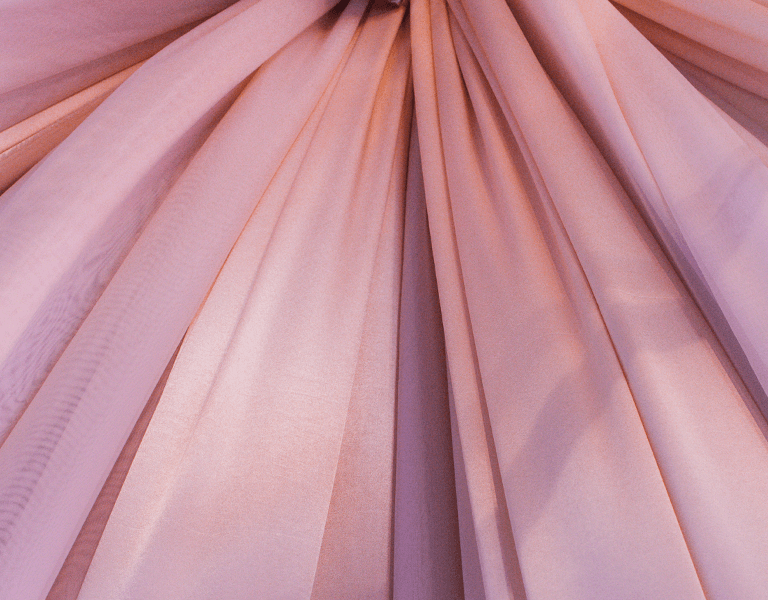
Market opportunity
Synthetic fabrics derived from petrochemicals make up 62% of all textiles produced globally with polyester being the most used.
Growing consumer concern about climate crisis and micro-plastic pollution make switching to more sustainable alternatives an attractive opportunity.
A growing market for sustainable sources of synthetics has emerged including recycled fibres (mainly from other waste plastic but also some from reusing textile waste) and bio-based (rather than oil-based).

Key sustainability issues
Up to a million tons of plastic microfibres pollute oceans and waterways each year from the washing of synthetic clothes.
Around 92 million tonnes of fashion waste were produced in 2015 - and it is predicted to grow with 62 percent by 2030.
Polyester does not biodegrade in landfills and, if produced without proper wastewater treatment systems, releases dangerous substances into the environment.

Key sustainability issues
Up to a million tons of plastic microfibres pollute oceans and waterways each year from the washing of synthetic clothes.
Around 92 million tonnes of fashion waste were produced in 2015 - and it is predicted to grow with 62 percent by 2030.
Polyester does not biodegrade in landfills and, if produced without proper wastewater treatment systems, releases dangerous substances into the environment.

Recycled polyester & synthetics
In the last 10 years, a new generation of recycling has emerged which takes synthetic materials already in existence (plastic bottles, ocean plastic, pre & post consumer waste textiles) and recycles them into new quality fibres.
Search for Global Recycled Standard certified manufacturers here (by entering GRS in the standard box at the side) and read on to discover more suppliers.
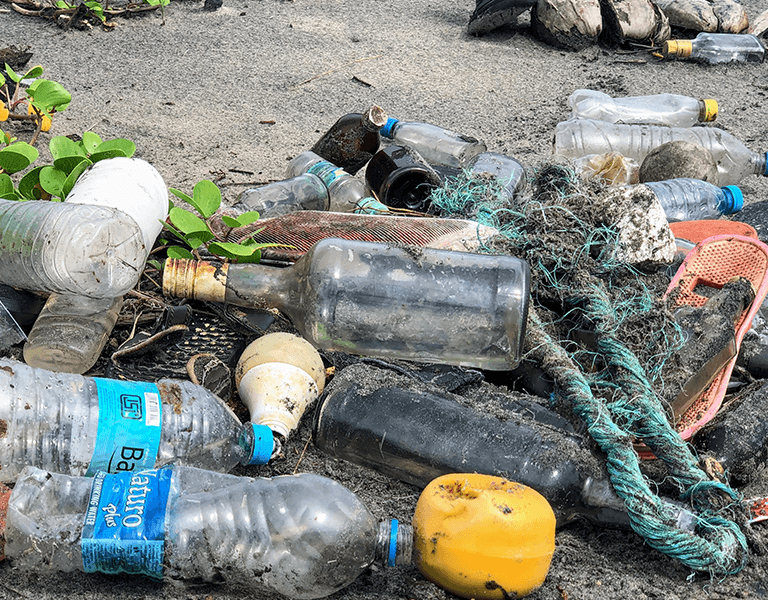
Recycled polyester & synthetics
In the last 10 years, a new generation of recycling has emerged which takes synthetic materials already in existence (plastic bottles, ocean plastic, pre & post consumer waste textiles) and recycles them into new quality fibres.
Search for Global Recycled Standard certified manufacturers here (by entering GRS in the standard box at the side) and read on to discover more suppliers.

Fabric from ocean plastic
ECONYL® regenerated nylon is a product that is made from rescued plastic waste like fishing nets and industrial plastic.
A nylon fibre is then completely regenerated to produce a product that is identical to its virgin counterpart and infinitely recyclable.
Brands using Econyl® include Kowtow (pictured here), Finisterre, Outerknown, Triumph, H&M, Stella McCartney, La Perla, and many more.
Bionic Yarn have a range of yarns from coastal and ocean plastic waste, including blends with other fibres. As used by Timberland, Burton, G-Star, O’Neill, H&M and Chanel.

Fabric from ocean plastic
ECONYL® regenerated nylon is a product that is made from rescued plastic waste like fishing nets and industrial plastic.
A nylon fibre is then completely regenerated to produce a product that is identical to its virgin counterpart and infinitely recyclable.
Brands using Econyl® include Kowtow (pictured here), Finisterre, Outerknown, Triumph, H&M, Stella McCartney, La Perla, and many more.
Bionic Yarn have a range of yarns from coastal and ocean plastic waste, including blends with other fibres. As used by Timberland, Burton, G-Star, O’Neill, H&M and Chanel.
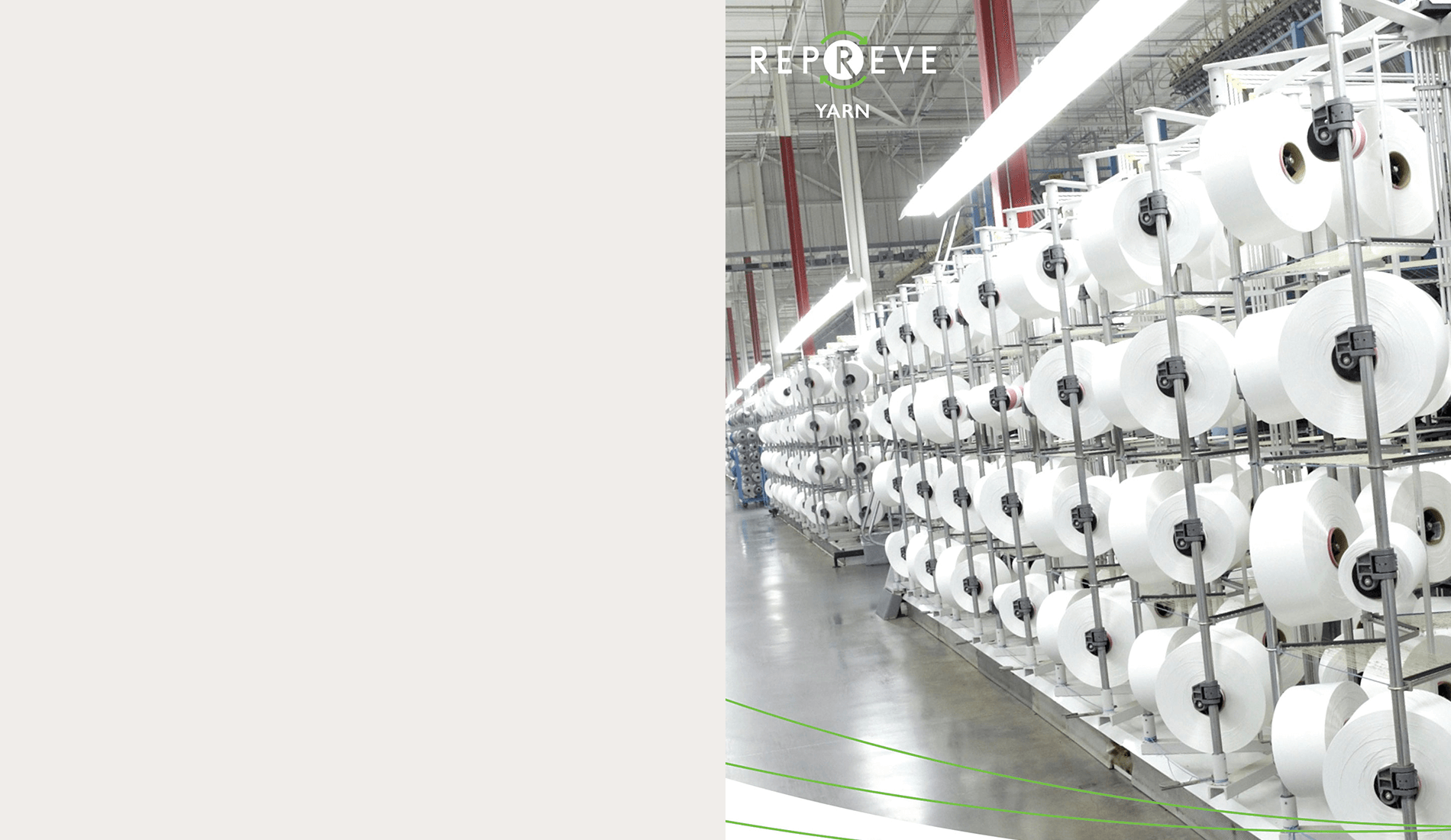
Polyester from plastic bottles
Repreve® is a performance fibre made from recycled materials including plastic bottles. Over 12 billion bottles have been recycled so far.
Brands currently using Repreve® include Patagonia, Volcom, Prana, Quicksilver, Mara Hoffman, Kathmandu, and Lane Silver.
NewLife yarns from Sinterama come from 100% post-consumer waste plastic bottles transformed through a mechanical not chemical process.
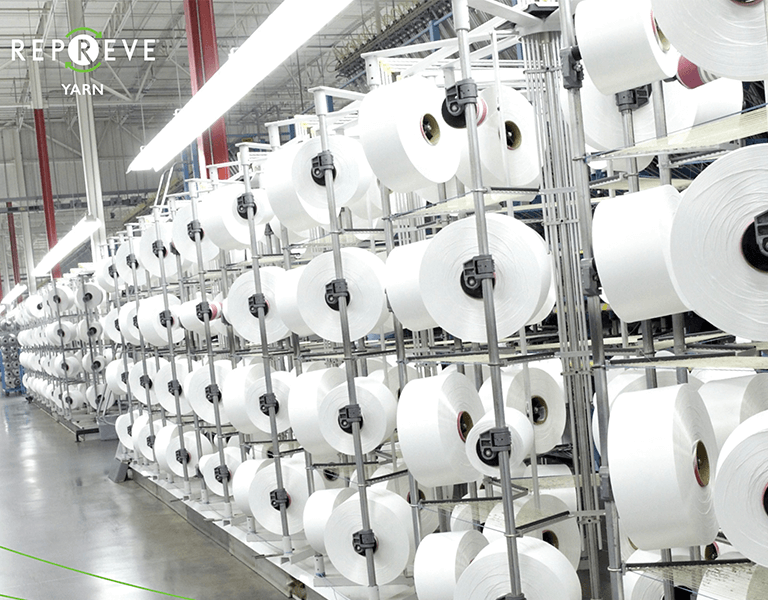
Polyester from plastic bottles
Repreve® is a performance fibre made from recycled materials including plastic bottles. Over 12 billion bottles have been recycled so far.
Brands currently using Repreve® include Patagonia, Volcom, Prana, Quicksilver, Mara Hoffman, Kathmandu, and Lane Silver.
NewLife yarns from Sinterama come from 100% post-consumer waste plastic bottles transformed through a mechanical not chemical process.
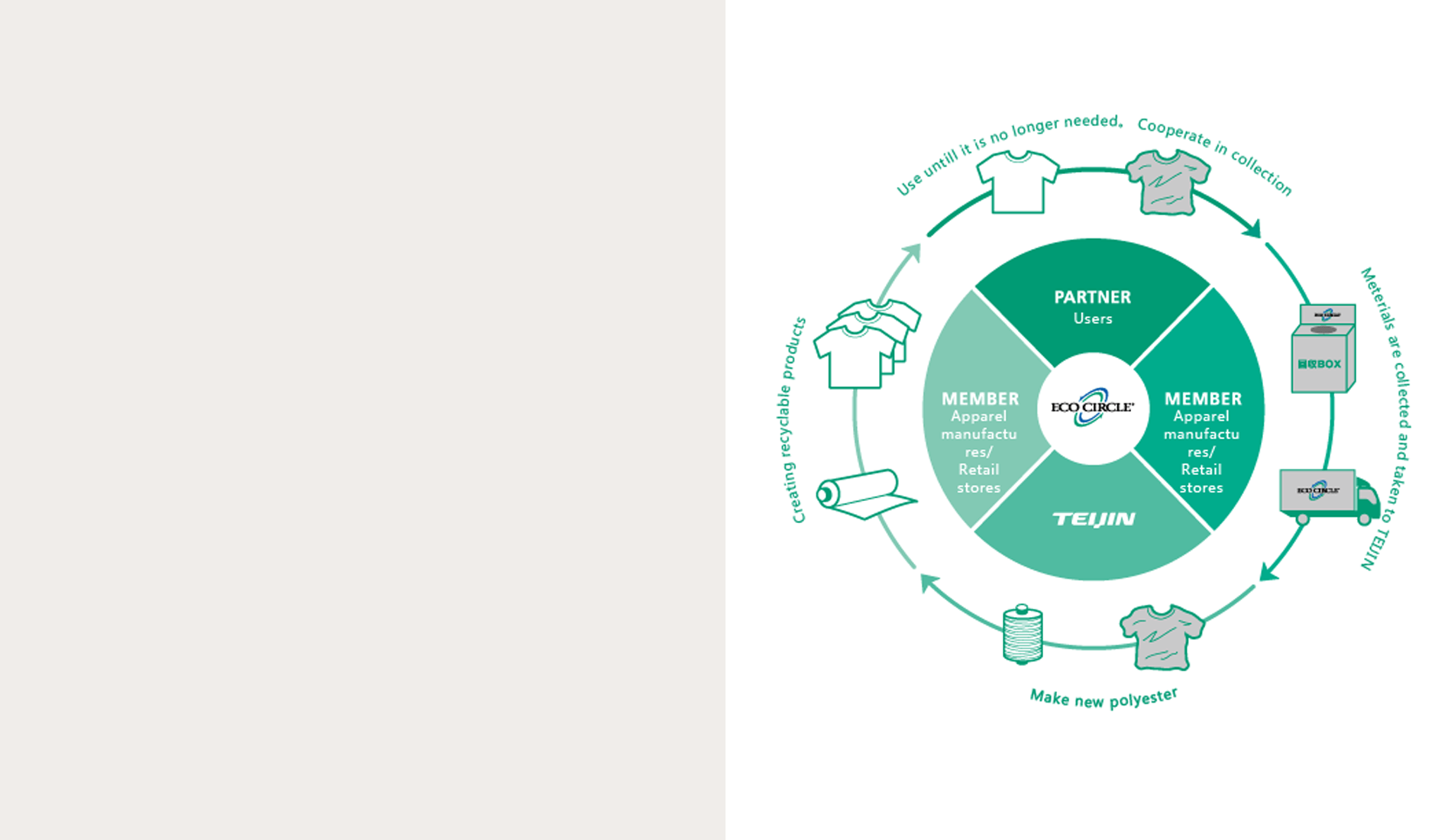
Circular polyester
Teijin works with sportswear manufacturers on its recycled Eco Circle line not just to develop products made of the recycled polyester but also to collect and recycle them again at the end of their useful life.
According to Teijin this repeatable recycling system reduces energy consumption and carbon dioxide emissions by approximately 80% each.
The Teijin ECO STORM® is a recyclable, waterproof/breathable material made from recycled fibres. The material is waterproof and breathable making it excellent for outdoor-wear.
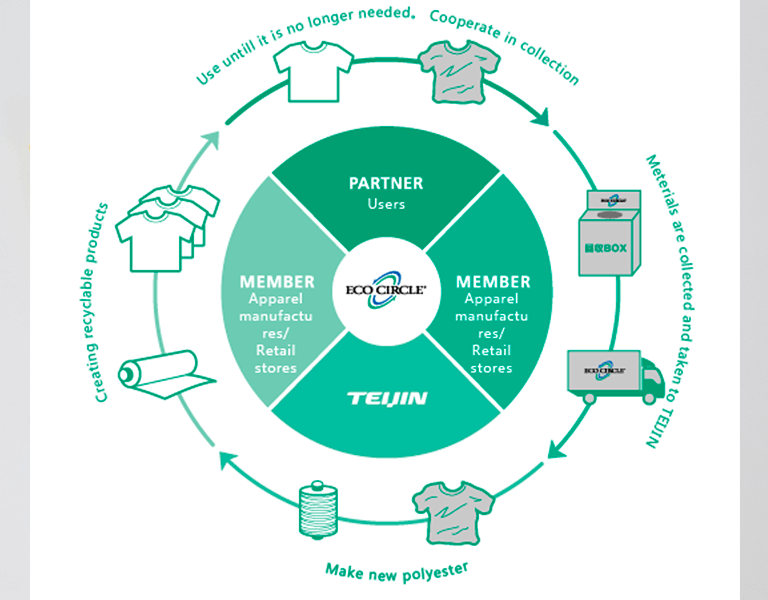
Circular polyester
Teijin works with sportswear manufacturers on its recycled Eco Circle line not just to develop products made of the recycled polyester but also to collect and recycle them again at the end of their useful life.
According to Teijin this repeatable recycling system reduces energy consumption and carbon dioxide emissions by approximately 80% each.
The Teijin ECO STORM® is a recyclable, waterproof/breathable material made from recycled fibres. The material is waterproof and breathable making it excellent for outdoor-wear.
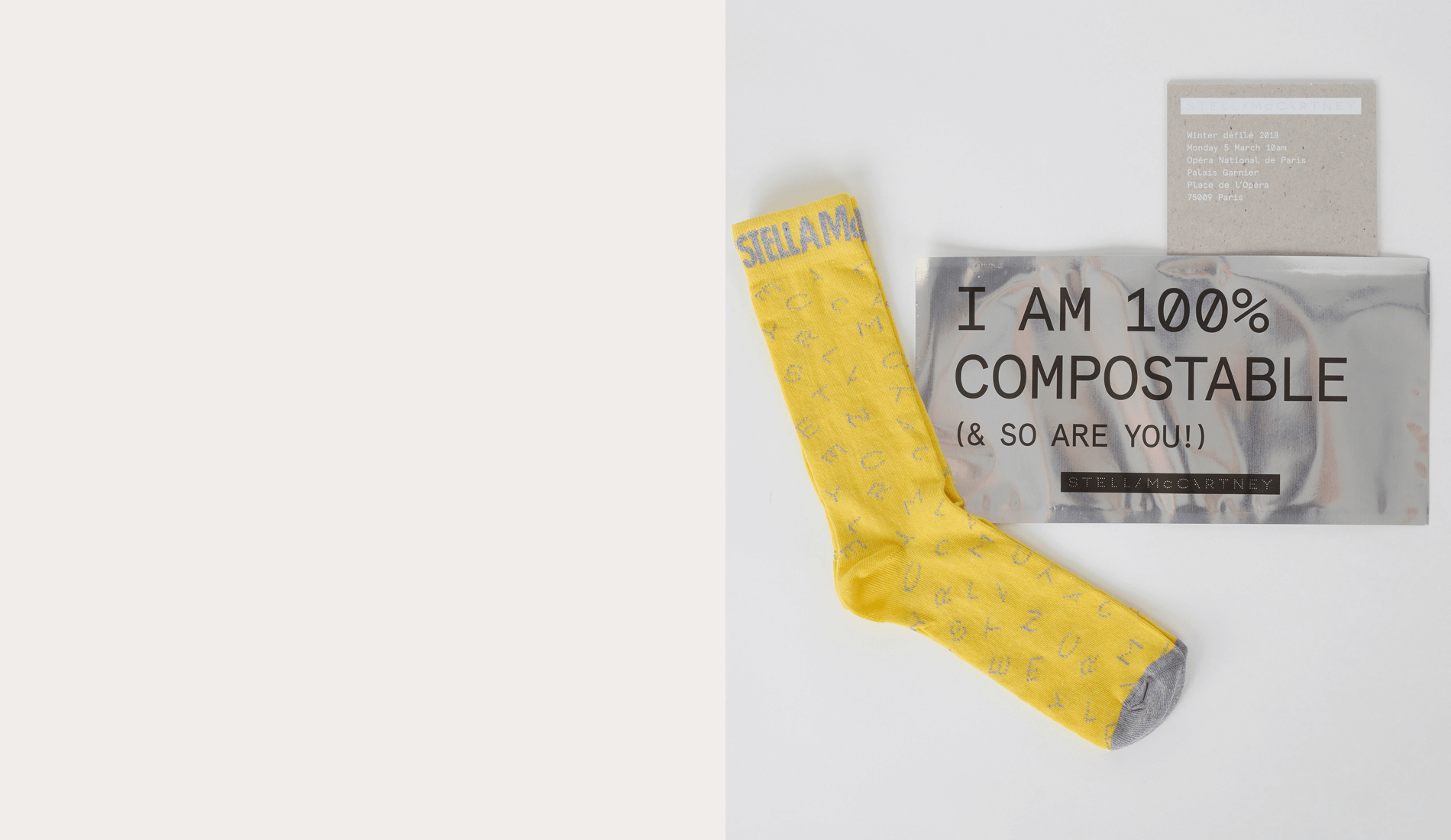
Going circular
Osomtex yarns and fabrics are made completely from discarded post-consumer and post-industrial textile waste.
The upcycling process uses no water, no dyes, and no harsh chemicals. In March 2018, Stella McCartney created an upcycled, zero-waste sock with Osomtex yarn (pictured).
Riopele's Tenowa fabrics are made from waste from the textile industry. They have a soft hand-feel and are anti-static. Q Nova from Fulgar is made, mechanically, from the scraps from their other production. It is lightweight and takes dye well.
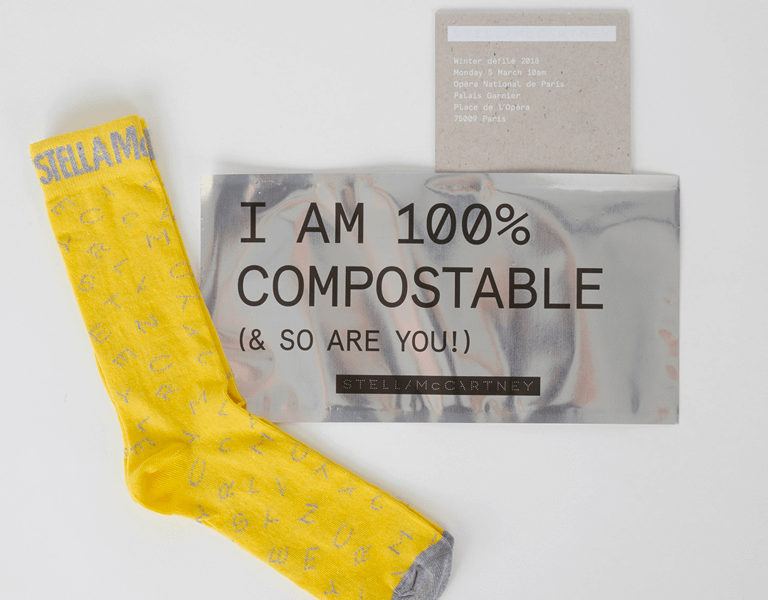
Going circular
Osomtex yarns and fabrics are made completely from discarded post-consumer and post-industrial textile waste.
The upcycling process uses no water, no dyes, and no harsh chemicals. In March 2018, Stella McCartney created an upcycled, zero-waste sock with Osomtex yarn (pictured).
Riopele's Tenowa fabrics are made from waste from the textile industry. They have a soft hand-feel and are anti-static. Q Nova from Fulgar is made, mechanically, from the scraps from their other production. It is lightweight and takes dye well.

Bio-based synthetic fabrics
- Mango Materials uses methane as a waste gas to produce polyester
- Japanese company, Toray's Ecodear® is a plant-based, biodegradable synthetic fibre
- Virent and FENCCorp created a fully bio-based polyester t-shirt in 2016 (pictured)
- Evo® from Fulgar is a yarn made from castor oil - a renewable resource that does not require high amounts of water nor takes away from land for food production
- Natural Fibre Welding have a performance fabric made from cotton that could be used to replace synthetics for some applications
Read more about biosynthetics on CO
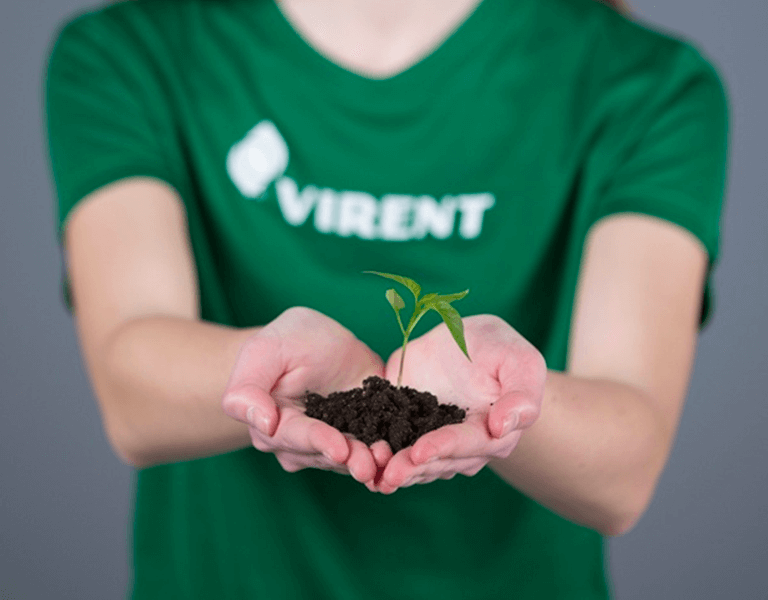
Bio-based synthetic fabrics
- Mango Materials uses methane as a waste gas to produce polyester
- Japanese company, Toray's Ecodear® is a plant-based, biodegradable synthetic fibre
- Virent and FENCCorp created a fully bio-based polyester t-shirt in 2016 (pictured)
- Evo® from Fulgar is a yarn made from castor oil - a renewable resource that does not require high amounts of water nor takes away from land for food production
- Natural Fibre Welding have a performance fabric made from cotton that could be used to replace synthetics for some applications
Read more about biosynthetics on CO

Biodegradable synthetic fabrics
Pontetorto whose Biopile fleece is made from Lenzing's cellulosic fibre Tencel® and therefore doesn't shed microplastics when washed. The fabric was used by outdoor brand VAUDE (pictured) for their AW 2018/19 collection.
Mectex's T-Green fabrics, Miti's Bioback, Santaconstancia's CO2 Control nylon fabrics and Sofileta's Green Oblige range use Amni Soul Eco® nylon which biodegrades in landfill in under five years. Dyntex has also developed an ultralight, biodegradable biosynthetic fabric for high-performance apparel.
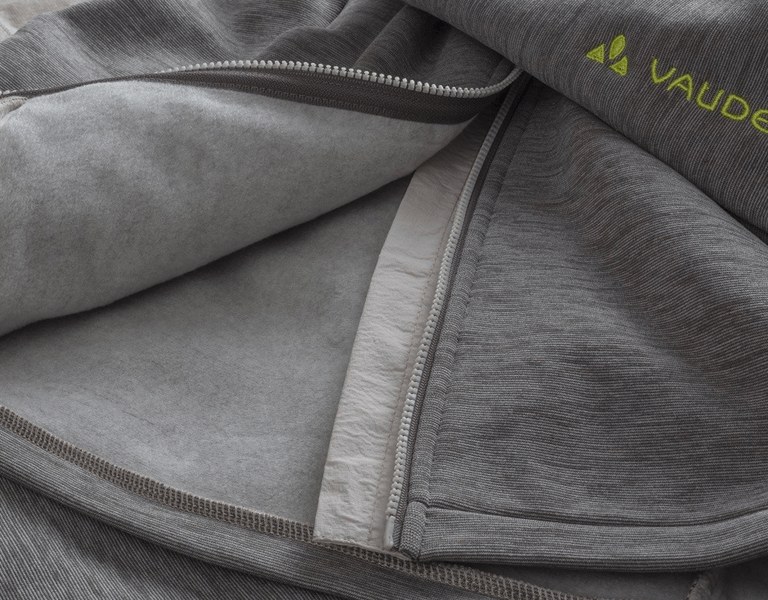
Biodegradable synthetic fabrics
Pontetorto whose Biopile fleece is made from Lenzing's cellulosic fibre Tencel® and therefore doesn't shed microplastics when washed. The fabric was used by outdoor brand VAUDE (pictured) for their AW 2018/19 collection.
Mectex's T-Green fabrics, Miti's Bioback, Santaconstancia's CO2 Control nylon fabrics and Sofileta's Green Oblige range use Amni Soul Eco® nylon which biodegrades in landfill in under five years. Dyntex has also developed an ultralight, biodegradable biosynthetic fabric for high-performance apparel.
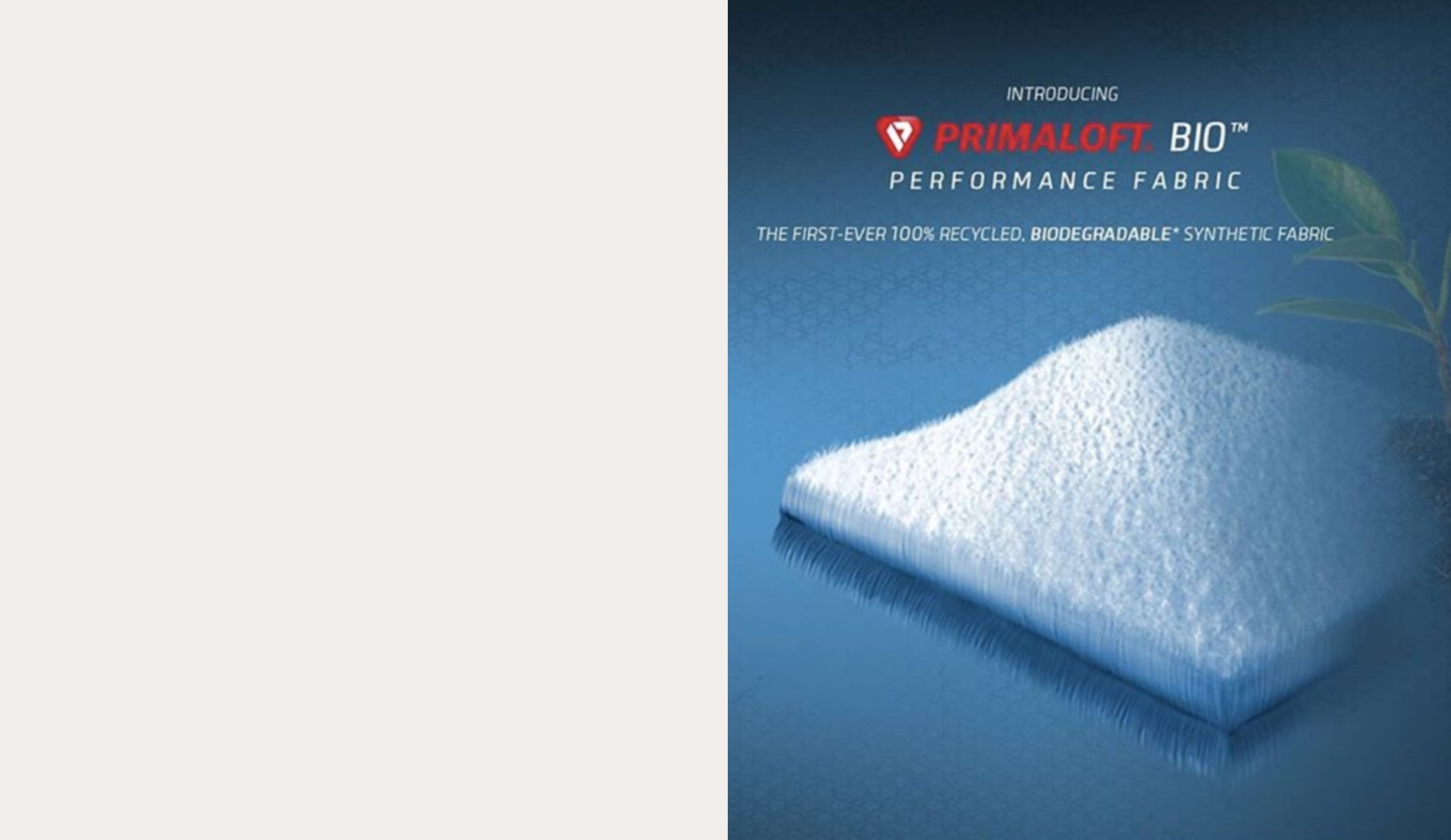
Biodegradable synthetic fabrics
Launched in March 2019 Primaloft Bio®, which comes as both an insulation (for padding) and fabric, claims to be the world's first recycled and biodegradable fabric. In landfill or sea conditions it will break down in under one year however it can also be recycled into new fibre.
Primaloft have partnered with Helly Hansen, Houdini, LL Bean, Vaude and Norrona for the first production and the fabric will be retailed from 2020.
Biodegradable synthetic fabrics
Launched in March 2019 Primaloft Bio®, which comes as both an insulation (for padding) and fabric, claims to be the world's first recycled and biodegradable fabric. In landfill or sea conditions it will break down in under one year however it can also be recycled into new fibre.
Primaloft have partnered with Helly Hansen, Houdini, LL Bean, Vaude and Norrona for the first production and the fabric will be retailed from 2020.
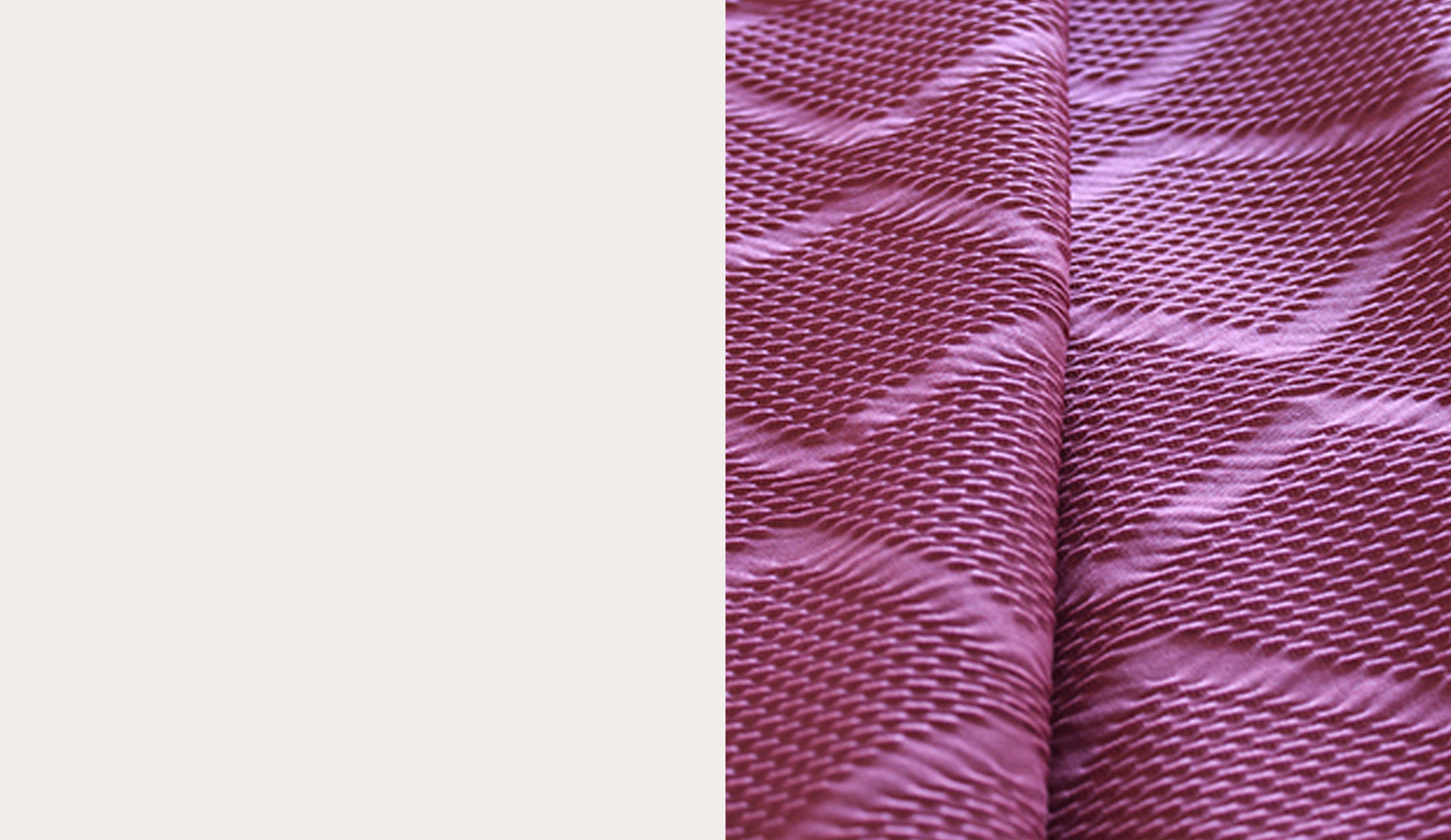
Innovation in Italian mills
Fabric supplier, Brugnoli, is using fellow Italian company, Fulgar's bio- and recycled-polyester fibres to supply more sustainable polyester to the fashion industry.
Brugnoli's Br4® fabric range uses Evo® by Fulgar® (see previous slide). These fabrics are light and stretchy with good thermal control.
Their B.Recycled range uses the regenerated nylon fibre Q-Nova® by Fulgar® and claims to be a 'zero-kilometre' product because of its supply chain that can be fully traced from the Fulgar recycling factory to the Brugnoli mill nearby which produces, dyes, and finishes the fabric.
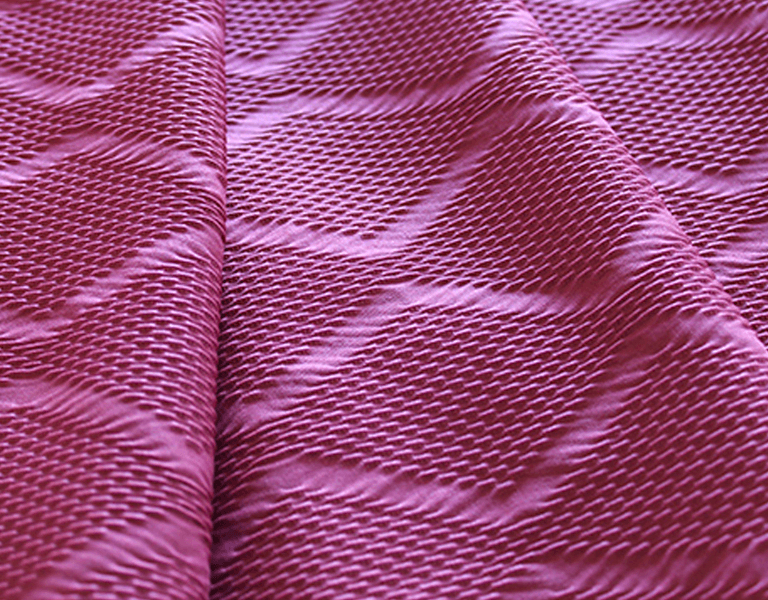
Innovation in Italian mills
Fabric supplier, Brugnoli, is using fellow Italian company, Fulgar's bio- and recycled-polyester fibres to supply more sustainable polyester to the fashion industry.
Brugnoli's Br4® fabric range uses Evo® by Fulgar® (see previous slide). These fabrics are light and stretchy with good thermal control.
Their B.Recycled range uses the regenerated nylon fibre Q-Nova® by Fulgar® and claims to be a 'zero-kilometre' product because of its supply chain that can be fully traced from the Fulgar recycling factory to the Brugnoli mill nearby which produces, dyes, and finishes the fabric.

Fabric wholesalers
Online fabric wholesalers Vivify Textiles offer a wide range of recycled polyester and nylon fabrics including satin, chiffon, crepe, interlock and suede, as well as blends with organic cotton.
See our Guide To Sustainable Fabric Wholesalers for other suppliers of sustainable synthetics with low minimum order quantities.

Fabric wholesalers
Online fabric wholesalers Vivify Textiles offer a wide range of recycled polyester and nylon fabrics including satin, chiffon, crepe, interlock and suede, as well as blends with organic cotton.
See our Guide To Sustainable Fabric Wholesalers for other suppliers of sustainable synthetics with low minimum order quantities.

Custom sustainable fabrics
Portuguese fabric supplier, Tintex commits to using at least 60% sustainable materials in its custom designed fabrics.
It is also a member of the Ellen MacArthur Foundation’s “Make Fashion Circular” initiative and has said it “aims to amplify and grow an eco-sustainable strategy for all its production”.
Responsible synthetics on offer include innovative fabrics blending recycled polyester, Roica Ecosmart™ yarns and Tencel®.
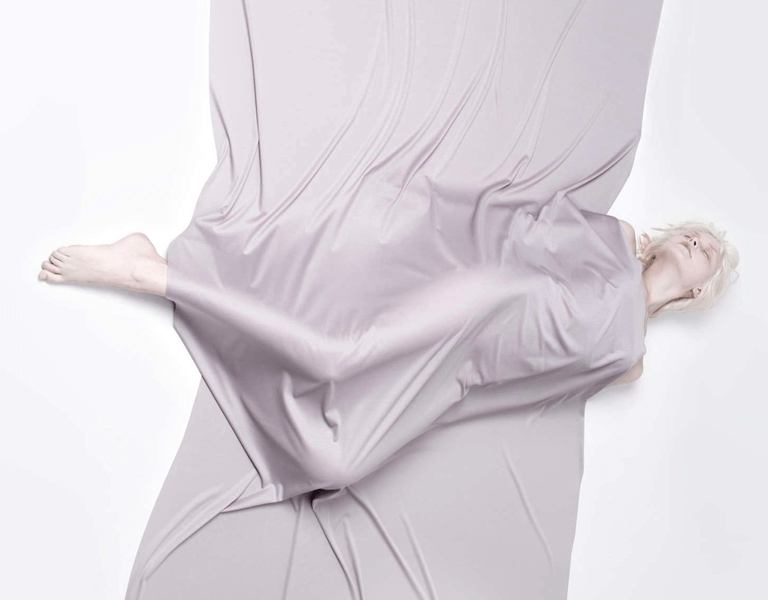
Custom sustainable fabrics
Portuguese fabric supplier, Tintex commits to using at least 60% sustainable materials in its custom designed fabrics.
It is also a member of the Ellen MacArthur Foundation’s “Make Fashion Circular” initiative and has said it “aims to amplify and grow an eco-sustainable strategy for all its production”.
Responsible synthetics on offer include innovative fabrics blending recycled polyester, Roica Ecosmart™ yarns and Tencel®.
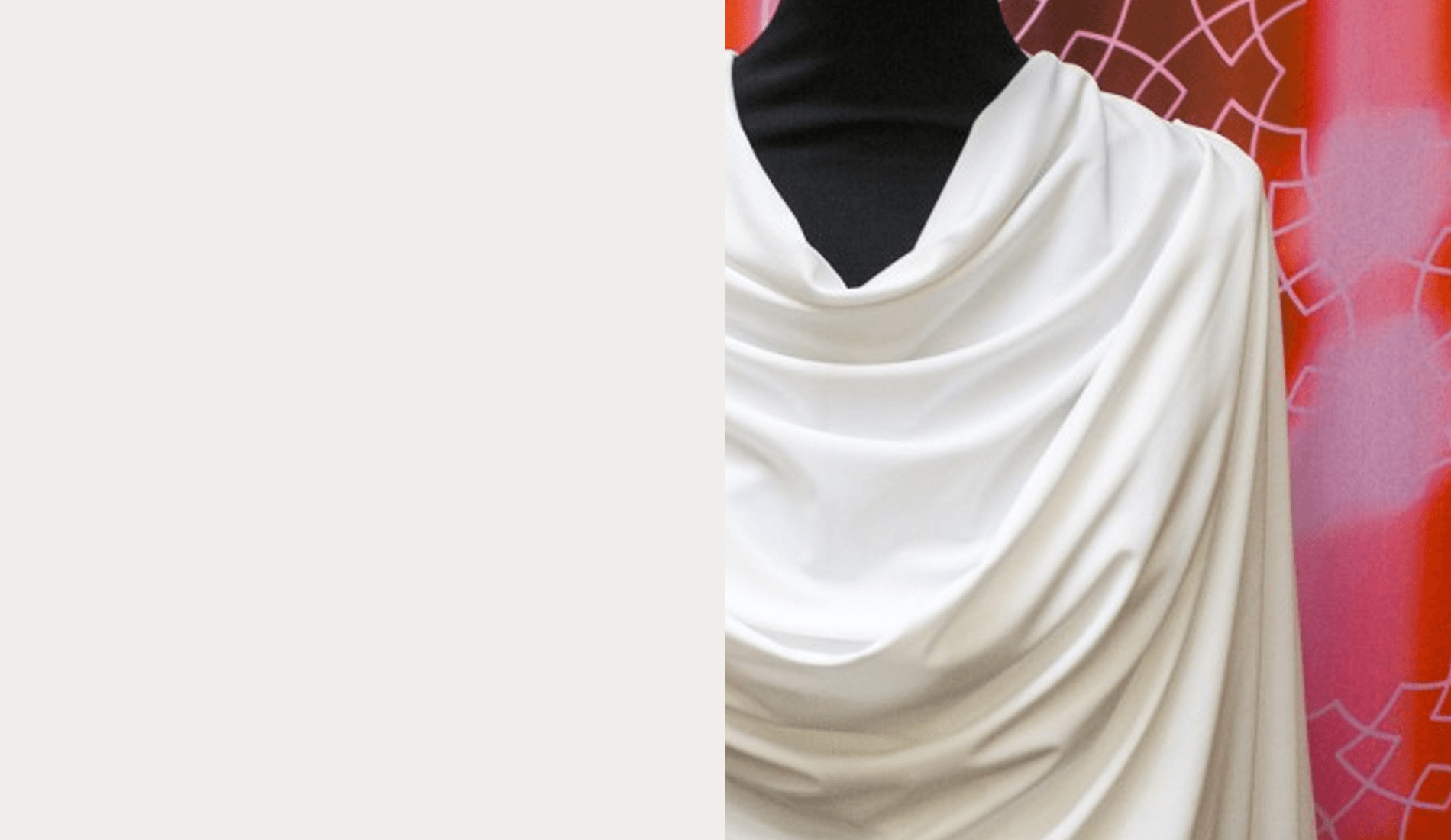
Print-your-own recycled polyester
For designers wishing to print on recycled polyester, Print Unlimited in the Netherlands has a range of plain and printed knitted fabric made from Vita recycled polyester which is ideal for dresses and activewear.
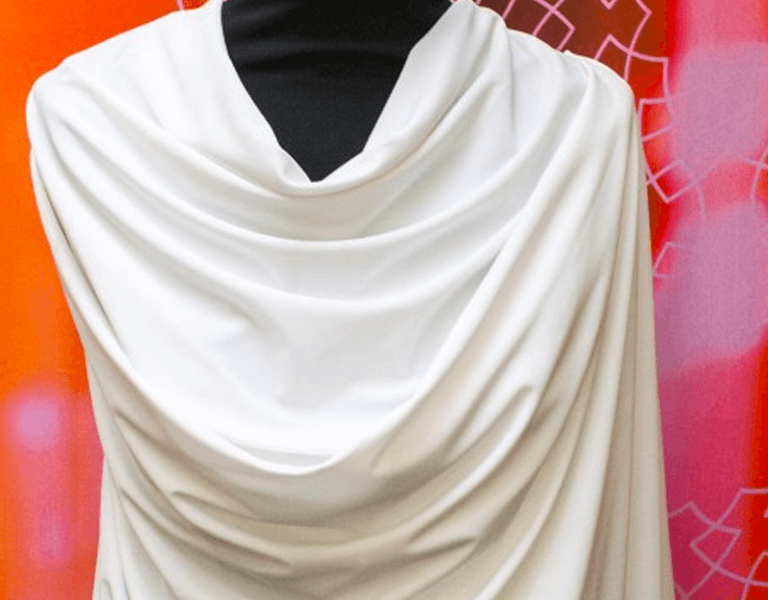
Print-your-own recycled polyester
For designers wishing to print on recycled polyester, Print Unlimited in the Netherlands has a range of plain and printed knitted fabric made from Vita recycled polyester which is ideal for dresses and activewear.


First published 12.11.2018 - Updated 17.12.2021
Related Reading
Sign up to connect with 50,000+ other sustainability-minded professionals and access over 300 pieces of actionable intelligence.
Common Objective is a global sourcing and information network that enables you to succeed in sustainable fashion business.
